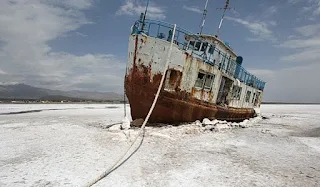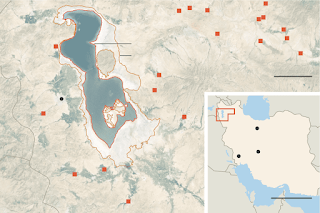Head of Iran’s Environmental Protection Organization (IEPO) Isa Kalantari said the country should use foreign funds to save Lake Oroumiyeh, the largest saltwater lake in the Middle East.
Speaking at a meeting with the representative of Leader of the Islamic Revolution in East Azarbaijan Province on Saturday, Kalantari raised the alarm about the consequences of the drying up of Lake Oroumiyeh and said domestic funds are not enough to restore the lake.
“We should use foreign financial resources to revive Lake Oroumiyeh,” he said.
As Lake Oroumiyeh is shrinking and deserts of salt expanding, Iranian officials are trying to find ways to avert an imminent disaster and to stop the salt lake from drying up.
One of the largest salt lakes in the world and classified as a Biosphere Reserve by UNESCO, Lake Oroumiyeh has lost more than 60 percent of its surface over the last two decades due to drought and the damming of rivers feeding it.
The disappearance of the lake could leave behind billions of tons of salt which in turn displace millions of people and endanger the ecosystem of all surrounding areas, whose economy relies on agriculture and tourism.
(Tasnim)
3/2/18
-
-
Speaking at a meeting with the representative of Leader of the Islamic Revolution in East Azarbaijan Province on Saturday, Kalantari raised the alarm about the consequences of the drying up of Lake Oroumiyeh and said domestic funds are not enough to restore the lake.
“We should use foreign financial resources to revive Lake Oroumiyeh,” he said.
As Lake Oroumiyeh is shrinking and deserts of salt expanding, Iranian officials are trying to find ways to avert an imminent disaster and to stop the salt lake from drying up.
One of the largest salt lakes in the world and classified as a Biosphere Reserve by UNESCO, Lake Oroumiyeh has lost more than 60 percent of its surface over the last two decades due to drought and the damming of rivers feeding it.
The disappearance of the lake could leave behind billions of tons of salt which in turn displace millions of people and endanger the ecosystem of all surrounding areas, whose economy relies on agriculture and tourism.
(Tasnim)
3/2/18
-
-



No comments:
Post a Comment
Only News